19 Best Sales Analytics Software & Tools (Reviews + How to Choose)
Empower your sales teams with actionable insights on sales related data with the best sales analytics software.
Last updated August 21, 2025
A guide to the best sales analytics tools
If you were shown an opaque ceramic cookie jar and asked to guess how many cookies were inside, it would be nearly impossible. Without knowing the size of the cookies, the volume of the jar, and how full it is, there simply wouldn’t be enough information to make an educated guess.
But imagine that jar is made of glass. Not only that, but you have the exact volume and weight of the jar, the size and weight of each cookie, and the maximum amount of cookies that can fit in the jar at a time. Now you can make a much more accurate prediction.
This is what sales analytics tools do for a business. They provide the information needed for businesses to predict with confidence.
In this comprehensive guide, we’ll answer the following questions about the functions and benefits of sales analytics, and discuss key features. We’ll also give you a breakdown of the twenty best analytical CRM platforms on the market today.
- What is sales analytics software?
- What are the features of sales analytics tools?
- What are the benefits?
- What are some trends?
- Sales analytics tools reviews
- How to choose the right sales analytics software?
- FAQs
- Make every decision data-driven
What is sales analytics software?
Sales analytics software is AI-powered technology that automatically gathers all types of sales data and transforms that data into important metrics related to the sales process. It then synthesizes these metrics into easy-to-read reports, allowing you to quickly identify areas that can be improved.
Once gathered and analyzed, specific sales metrics can be used to optimize your sales process, improve customer service, and even forecast future sales. Essentially, keeping your eye on the right metrics means more sales, and better decision-making. And analytics software works behind the scenes to seamlessly generate this valuable information.
How do sales analytics systems work?
They work by instructing smart AI technology to automatically capture relevant sales data. This data is gathered in real time, so businesses have access to everything they need to know to make decisions quickly.
The software then analyzes this data, and creates reports based on company needs. For example, a company manager may need to see a report stacking current deals won against deals won in the last quarter. Reports make it easy for businesses to understand the data they have collected, and see how these metrics can be used to improve processes and make predictions.
Why use sales analytics software?
Because it’s simply the best, most efficient way to make fast and accurate business decisions and predictions. Without sales analytics, businesses are operating in the dark. They may find themselves making crucial operational choices based on guesswork, and any data they collect is subject to human error. This isn’t just outdated—it leads to needless mistakes.
Businesses can also use sales analytics software to increase sales. For example, a business that has a large pool of qualified leads, but a low conversion rate, may wonder why, exactly, so many leads are dropping out. Without it, the company’s “strategy” will likely be to aimlessly implement changes until they happen to hit upon a solution. Analytics software pinpoints problems and solutions fast, saving time and money.
What are the features of sales analytics tools?
Because of the wide breadth of data they collect, these platforms come with an array of useful features. Here are some of the most commonly used:
- Sales data: First and foremost, with sales analytics comes sales data. This data can be related to performance, operations, customer service, and more, depending on which metrics a business is most interested in tracking. It can be extremely useful to track lead yield and conversion rates to determine how successful the pipeline is in producing customers. Try tracking deals won and measure it against your goals to see if you’re on pace for the quarter. Whatever your question may be, sales analytics has the answer.
- Sales dashboard: Most sales analytics platforms offer a centralized sales dashboard where team members can access all data and reports in one location. Not every team member or department needs to see every piece of data, so sales dashboards can be customized to include only the relevant information.
- Sales reporting software: A sales report makes the data make sense. Great CRM software synthesizes data into charts, graphs, and visuals that are easy for team members to interpret.
- Sales forecasting: Sales forecasting tools analyze past and present data to predict the future. These tools can project run rate (an estimate of a company’s annual earnings), and net sales for a given time period. This tells businesses if they’re on track to reach goals, and allows them to make spending decisions with confidence. Many platforms even work externally to forecast industry trends, so businesses can stay one step ahead of the competition.
What are the benefits of sales analytics software?
The benefits of sales analytics resonate throughout the entire sales process and beyond. They allow businesses to:
- Improve sales performance: By tracking crucial performance metrics, analytics illuminates the areas of sales performance most in need of improvement. Tracking a metric like win rate (the number of deals won divided by the number of deals created) allows businesses to measure the effectiveness of their sales processes, and make smart adjustments when things aren’t working. Analytics can also report on individual rep performance. This helps companies identify which reps might need further support and coaching.
- Make informed decisions: If businesses are aware of their projected revenue, they can make informed decisions about spending and hiring. By tracking monthly recurring revenue and using the exponential smoothing method, businesses can predict future sales and revenue. The more accurately your company can see the future, the more confidently they can plan.
- Set goals and ensure they are met: Analytics tools allows businesses to set goals related to performance, revenue, and growth. The software then generates reports that show how on track businesses are in terms of achieving these goals. And if a business is falling behind, it can be used to identify the exact spots where team members might benefit from shifting their tactics.
- Close more deals: Sales analytics platforms help businesses close more deals by identifying ways to optimize their sales process. With the help of pipeline tracking tools and visuals, reps can see where each customer is in their lifecycle, and determine which steps to take next. Automated analysis can measure at which areas in the pipeline leads tend to drop off. Sometimes a simple process change or rerouting is all it takes to boost sales; but without accurate data, it’s impossible to know.
What are some trends related to sales analytics software?
The most pressing trend in sales analytics software today is a rapidly growing market for future-focused analysis. Descriptive and diagnostic analysis, which focus on the past and the present, have been popular for several years. These types of analytics describe the “what” and “why” of the past, and can be used to pinpoint what worked and what didn’t.
Predictive and prescriptive analysis rely on more advanced technology. Predictive analytics use data to forecast the future, while prescriptive analytics provide companies with a plan of action. And both are currently gaining in popularity. In fact, the predictive analytics market is projected to grow from 10.5 billion to 28.1 billion by 2026.
Forecasting hasn’t always been completely reliable. But as forecasting technology improves, more companies are willing to invest in accurate revenue predictions.
Top sales analytics reviews
Copper
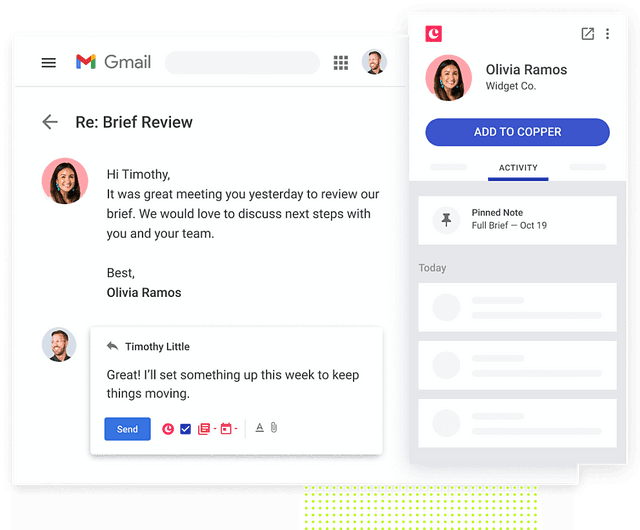
Copper is a CRM platform that was built for Google Workspaces. It was designed specifically for small businesses, and features integrations with most Google apps.
Copper pipeline analytics automatically capture data as customers travel along a visual sales pipeline. The software also tracks industry trends to keep businesses prepared.
Features:
- Sales pipeline management
- Interaction tracking
- Customizable reports
- Lead qualification
- Predictive analysis
Sales Cloud Einstein
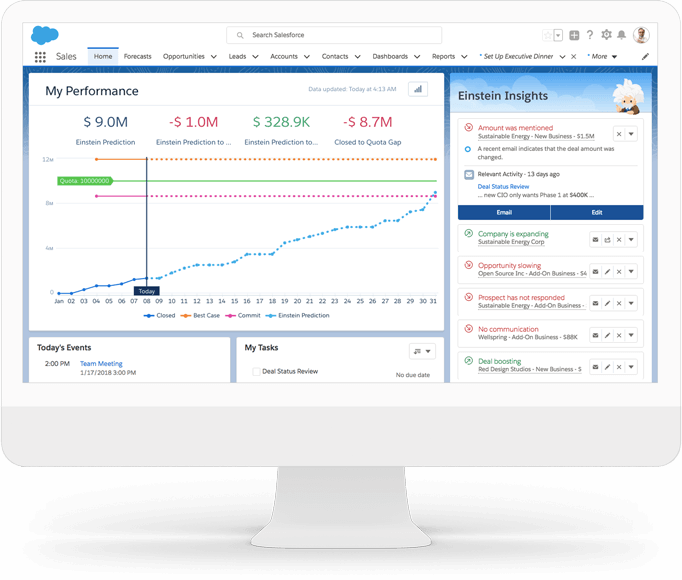
Sales Cloud Einstein is the data and analytics tool under the Salesforce umbrella of CRM and marketing solutions. Einstein uses AI technology to capture data during the sales process, and makes predictions.
Einstein scores leads and opportunities, provides pre-built visual reports, and operates from a central dashboard so all information is available in a single location.
Features:
- Prospecting tools
- Sales trend analysis
- Goal management
- Correlation analysis
- Dashboard
NetSuite CRM

NetSuite is a CRM solution that tracks the customer sales lifecycle and searches for upselling and renewal opportunities.
NetSuite operates from a central dashboard, and uses embedded analytics to track performance across all teams and departments. The platform also features financial and operational reporting.
Features:
- Customizable reports
- Performance metrics
- Task management
- Real time monitoring
- Forecasting
Sugar CRM
Sugar CRM is a platform that attempts to deliver predictions even with limited or incomplete data. Sugar CRM’s predictive analytics feature, SugarPredict, uses AI technology to gather data and make these predictions.
SugarPredict can also identify leads who are the closest fit to customer targets, analyze and track performance metrics, and collect information on customer satisfaction.
Features:
- Interaction tracking
- Lead qualification
- Performance metrics
- Forecasting
- Sales pipeline management
Hubspot
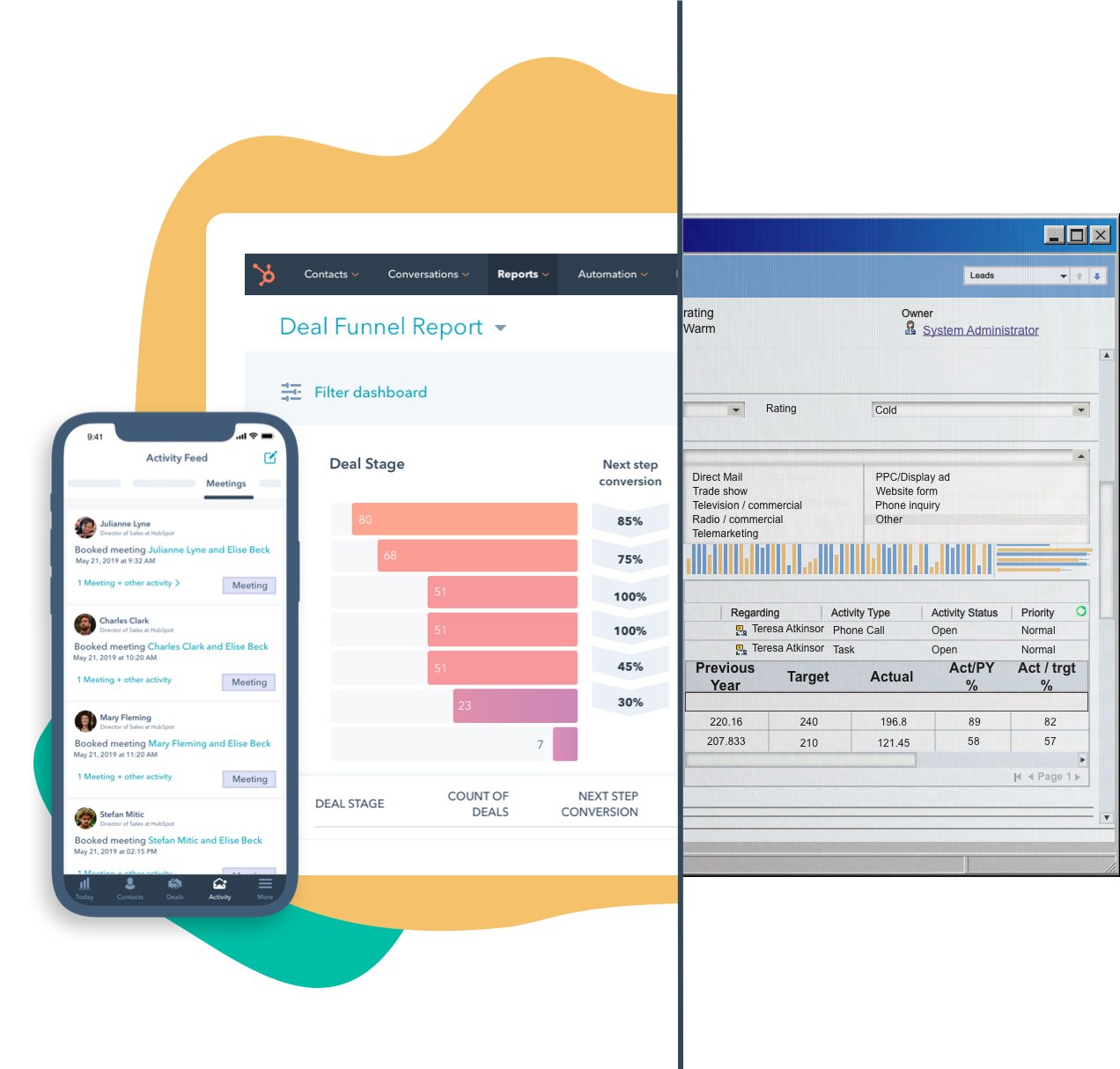
Hubspot is a CRM platform consisting of five “hubs” for different areas of business: marketing, sales, service content management, and operations. Hubspot’s sales hub offers sales analytics tools, and integrates with many other platforms and business apps.
Hubspot’s reporting and analytics tools track rep’s performance metrics. The software also generates sales reports, and forecasts future deals.
Features:
- Client management
- Relationship tracking
- Performance metrics
- Reporting
- Lead distribution
Zoho CRM
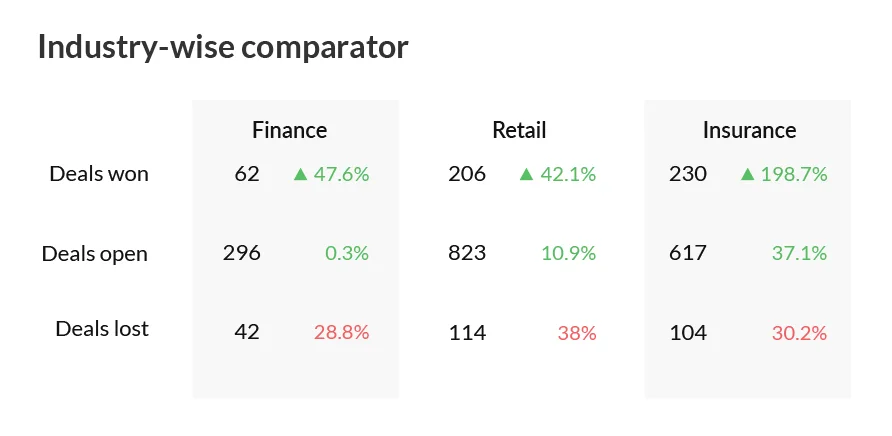
Zoho CRM is a solution for large or small businesses that tracks customers through all stages of the pipeline.
Zoho CRM’s SalesIQ feature captures leads and qualifies them by automatically identifying desired characteristics. It then distributes the most promising leads to the right sales reps. SalesIQ integrates with the CRM database, and is designed to scale with a business.
Features:
- Relationship tracking
- Negative feedback management
- Predictive analysis
- Pipeline management
- Statistical analysis
Pipedrive
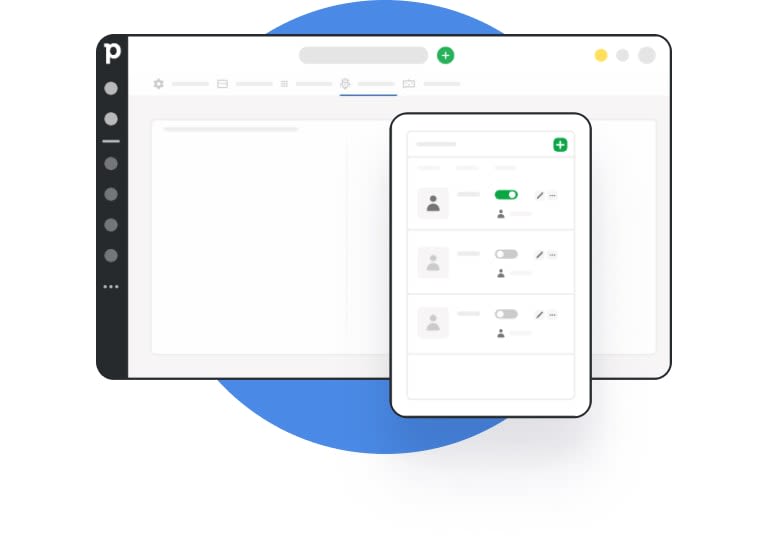
Pipedrive is a CRM solution with a heavy focus on qualifying leads and nudging them along the sales pipeline. Users get started on the software by building and customizing a visual pipeline.
As leads move along the pipeline, Pipedrive collects data to assist reps in next steps. The software also tracks calls, emails, and contact history, as well as automating administrative tasks. Interactive dashboards track real-time customizable reports on metrics and KPIs.
Features:
- Opportunity management
- Pipeline management
- Transfers/routing
- Goal tracking
- Interacting tracking
Insightly
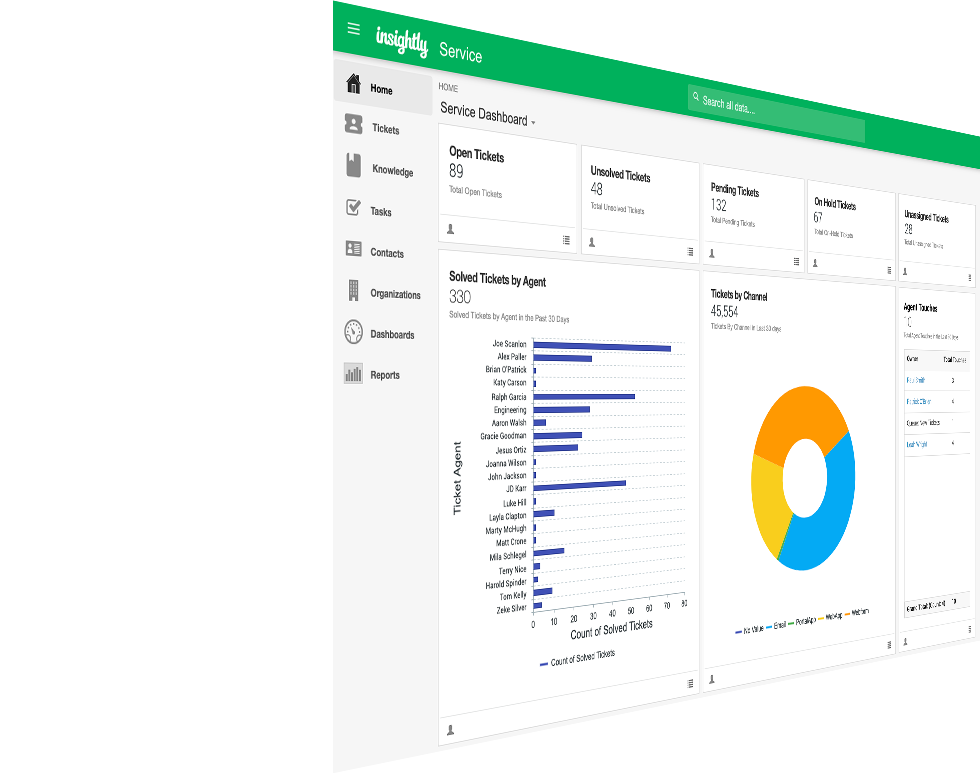
Insightly is an analytical CRM platform with native integrations to Gmail and Google Workspaces. It offers a dashboard of customer information, and identifies relationships between customers and leads through data gathering.
Insightly automatically captures and stores data, and offers customizable reporting. Users can schedule and run reports at any time. They can also set permissions and visibility of these reports by business role or department.
Features:
- Lead qualification
- Task management
- Marketing automation
- Customizable reports
- Mobile access
Nutshell
Nutshell is a CRM and email marketing platform designed specifically for B2B organizations. The platform merges sales and marketing, and offers several sales analytics tools.
Nutshell’s activity reports track what reps are doing on a daily, weekly, and monthly basis to connect with customers. It integrates with a variety of common business apps, and provides both prospecting and forecasting tools.
Features:
- Sales forecasting
- Performance metrics
- Prospecting tools
- Marketing automation
- Task management
Keap
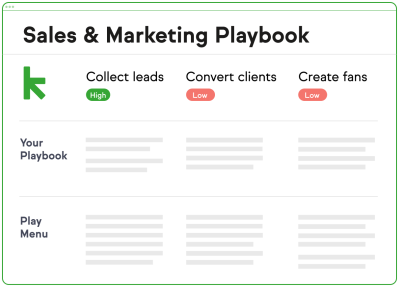
Keap is an all-in-one CRM platform that offers different packages for different sized businesses, according to company needs.
Keap features an array of sales analytics and reporting tools. The software can track deals and customer interactions within a certain period and stack them up against previous sales periods. Users can seek out specific datasets within the software, and generate relevant reports when they are needed.
Features:
- Analytics/ ROI tracking
- Pipeline management
- Source tracking
- Subscriber management
- Customer surveys
Salesmate
Salesmate is a CRM and automation platform featuring integrations with Google, Zoom, and more. Salesmate provides targeted, personalized, and automated communication with leads and prospects.
Salesmate includes the ability to set goals and KPIs, request customizable reports, generate sales forecasts, and build a customer pipeline. The centralized dashboard tracks activity, goals, and performance metrics.
Features:
- Customizable reports
- Prioritization
- Activity dashboard
- Performance metrics
- Lead management
Freshsales

Freshsales is a cloud-based CRM platform for businesses to manage and track their relationships with customers and leads.
Freshsales users create their own analytics dashboards and reports with pre-made templates. The software tracks performance metrics and reports which sales activities are the most effective.
Features:
- Opportunity management
- Alerts/notifications
- Cataloging/categorization
- Forecasting
- Lead qualification
Chorus.ai

Chorus.ai is an AI-powered go-to-market solution from ZoomInfo. With a focus on B2B companies, Chorus.ai is intended to provide analytics specifically to sales teams.
Chorus.ai transcribes and analyzes sales meetings to identify the sales tactics with the highest success rate, and locate opportunities for coaching. Reps use this data to replicate the sales meetings of their well-performing peers.
Features:
- Activity dashboard
- Call recording
- Interaction tracking
- Analytics/reporting
- Performance metrics
Agile CRM
Agile CRM is a CRM solution for businesses with a heavy focus on customer service. The platform caters to call centers, and its analytics are geared towards improving communications.
Users of Agile CRM can create and send customized reports using relevant data. Users can also schedule recurring reports to be delivered directly to their inboxes on a daily, weekly, or monthly basis.
Features:
- Call center management
- Performance metrics
- Goal setting/tracking
- Pipeline management
- Lead nurturing
Pipeliner
Pipeliner is a CRM platform centered around its visual pipeline tool. With the platform, users can build and refine a sales pipeline, as well as track progress visually when customers move through their lifecycle. Analytics and reports identify sales steps that could use improvement.
With Pipeliner, users can create and share custom reports, and also set privacy restrictions regarding which team members can access what information.
Features:
- Pipeline management
- Lead qualification
- Calendar/reminder system
- Task management
- Customized reports
Nimble CRM

Nimble is a CRM solution that unifies contacts from all business tools into one database. Nimble pulls contacts from existing databases, email, and social media, and puts their information in one location.
Nimble provides a number of customized sales metrics, such as how much reps won from deals within the past month. It will also automatically notify team members of impending tasks and appointments.
Features:
- Predictive analysis
- Sales forecasting
- Opportunity management
- Interaction tracking
- Task management
Creatio
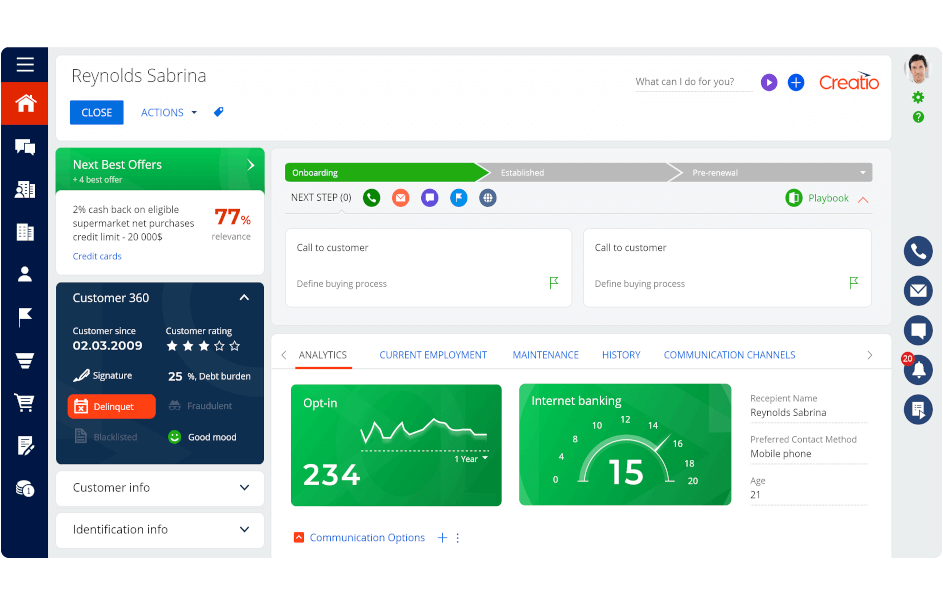
Creaotio is a marketing and sales CRM platform that caters to large and mid-size businesses. Creatio’s intelligent data feature identifies holes in customer information, and then sources it to complete profiles.
Creatio’s forecasting tools use past sales data, along with trends, to predict future sales. Users can apply data filtering tools to get to the information that is relevant to them.
Features:
- Analytics/ROI tracking
- Real time data
- Sales forecasting
- Performance metrics
- Task management
Capsule
Capsule is an online CRM platform. Its analytics software forecasts sales pipeline value
and tracks activity across teams.
The software offers a drag-and-drop visual sales pipeline, as well as a few different pipeline reports that include current pipeline activity and opportunity tracking. Performance reports include how many calls a day reps are making, and how many leads are generated in a given period.
Features:
- Sales trend analysis
- Source tracking
- Graphical data representation
- Lead qualification
- Forecasting
Outreach
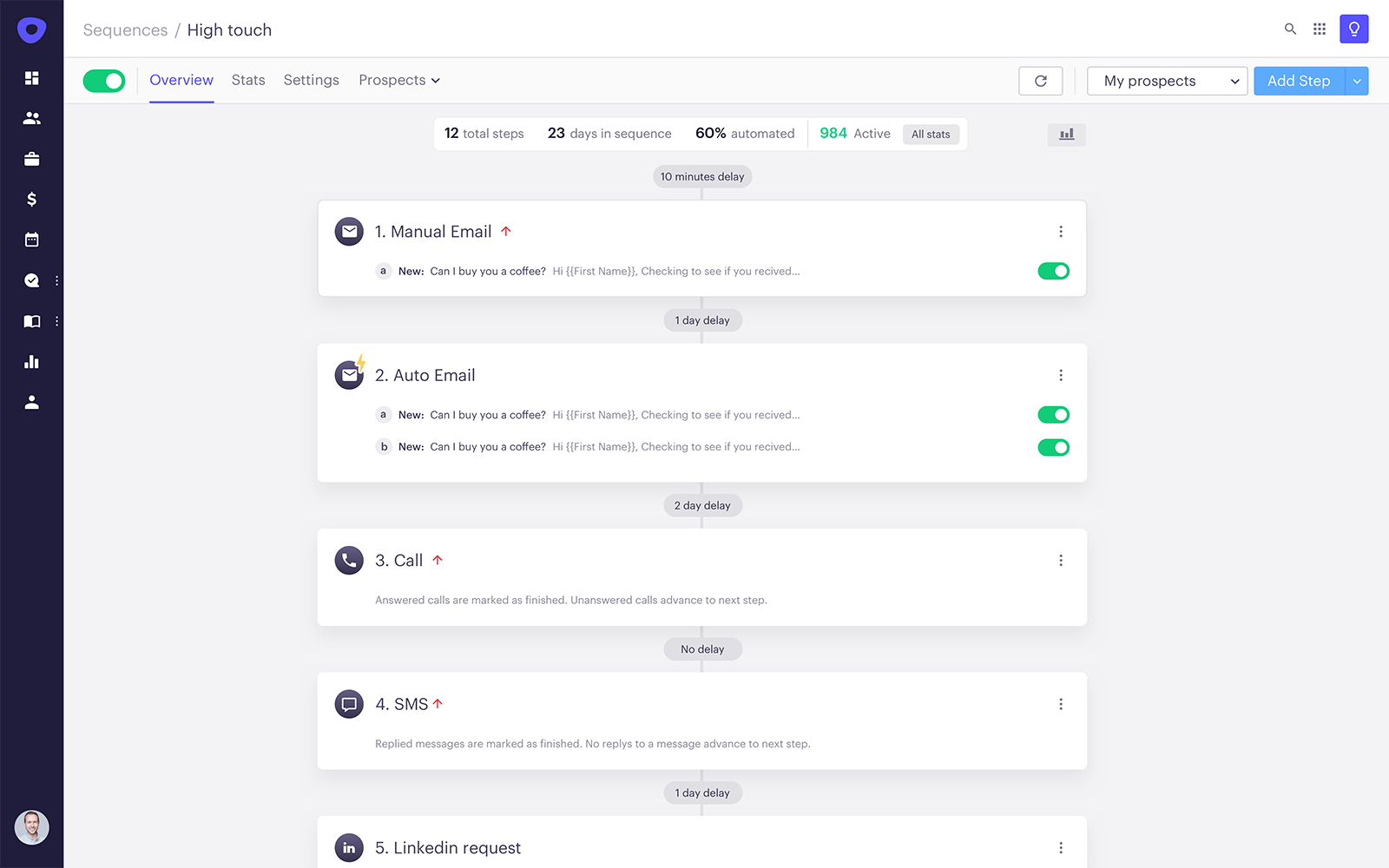
Outreach is a CRM and sales engagement platform. Outreach users build a visual pipeline and track customer activity. Users then build a playbook from what steps work best, according to the data.
The platform’s forecasting tool uses data to predict future sales and revenue. It also allows users to put in “what if” scenarios to see how forecasting changes in different circumstances.
Features:
- Prospecting tools
- Performance management
- Opportunity management
- Pipeline management
- Collaboration tools
How to choose the right sales analytics software?
There are a few questions to ask yourself when choosing sales analytics software:
- What are your sales goals? Knowing your goals will help you determine what kind of data you need to measure. Look for platforms that include this type of reporting.
- Are you aiming for growth? Are you looking to expand your team and/or introduce more products once analytics boosts your sales? Make sure to choose a platform that can grow with your company.
- Do you want a platform that makes predictions? Not every analytics platform is predictive. If you want a platform that forecasts and makes recommendations based on data, you will have to ensure this feature is included.
Frequently asked questions
Turn intelligence into stronger relationships
Sales intelligence gives you the data—but the real advantage comes from using that knowledge to personalize every customer interaction.
Zendesk enhances your CRM with AI-driven insights, real-time analytics, and customer context that help reps tailor every conversation. From lead qualification to service follow-ups, Zendesk ensures your teams act on data quickly and personally. Try Zendesk free for 14 days.
Related posts
What is CRM software? 8 best CRM tools of 2025
CRM software helps businesses strengthen customer relationships and improve retention. Find the top solution with this guide.
16 types of sales tools to choose from
AI is already being used by all types of sales orgs to automate and improve sales processes. Here’s what you need to know.
Sales pipeline management software
Take full control of your sales process with powerful pipeline management — from your very first customer to scaling globally.
Sales Force Automation (SFA) Guide for 2025
Save your sales team time and sanity with sales force automation.
